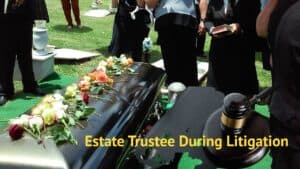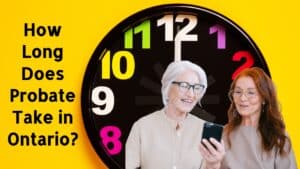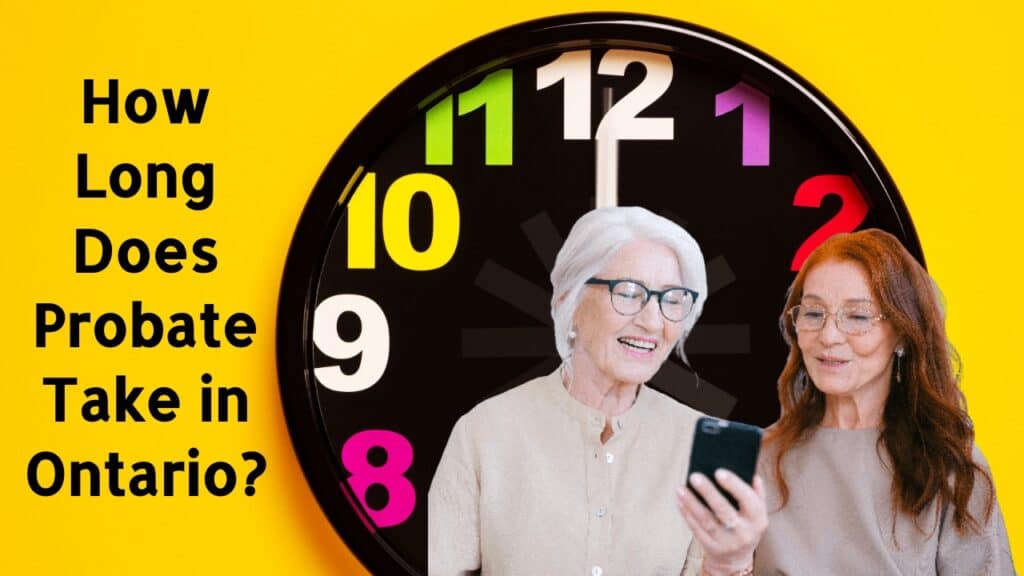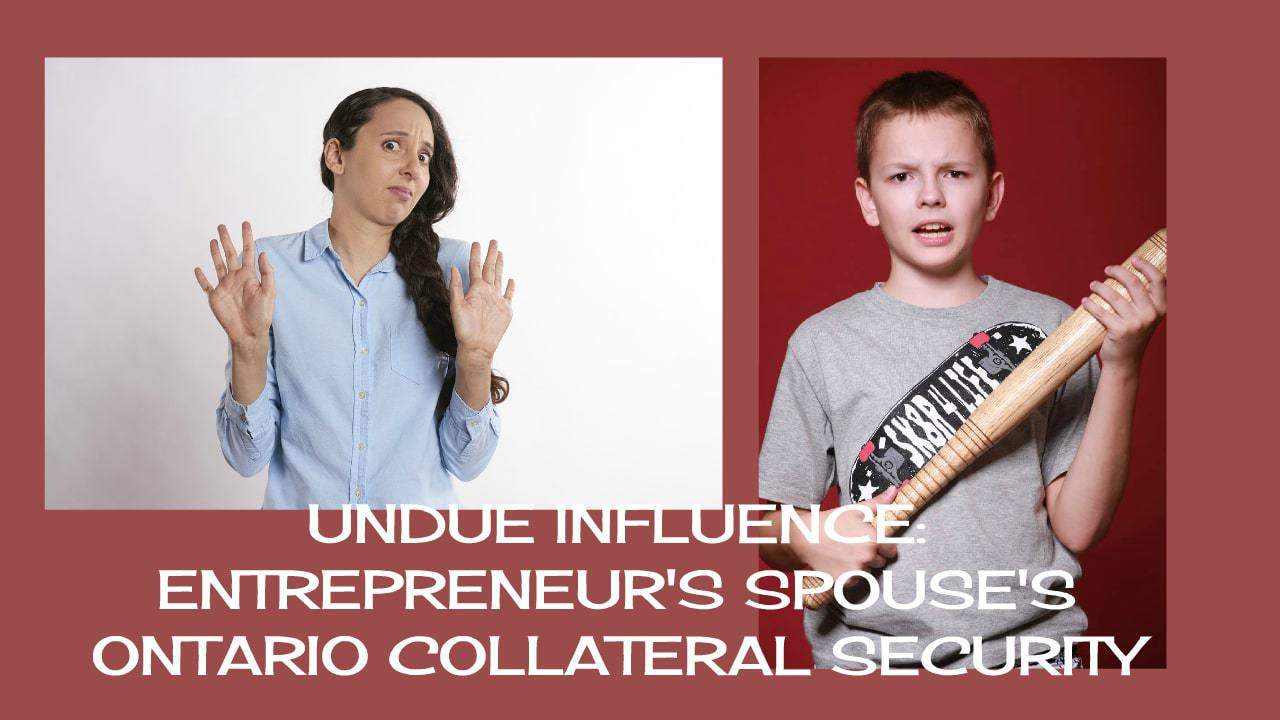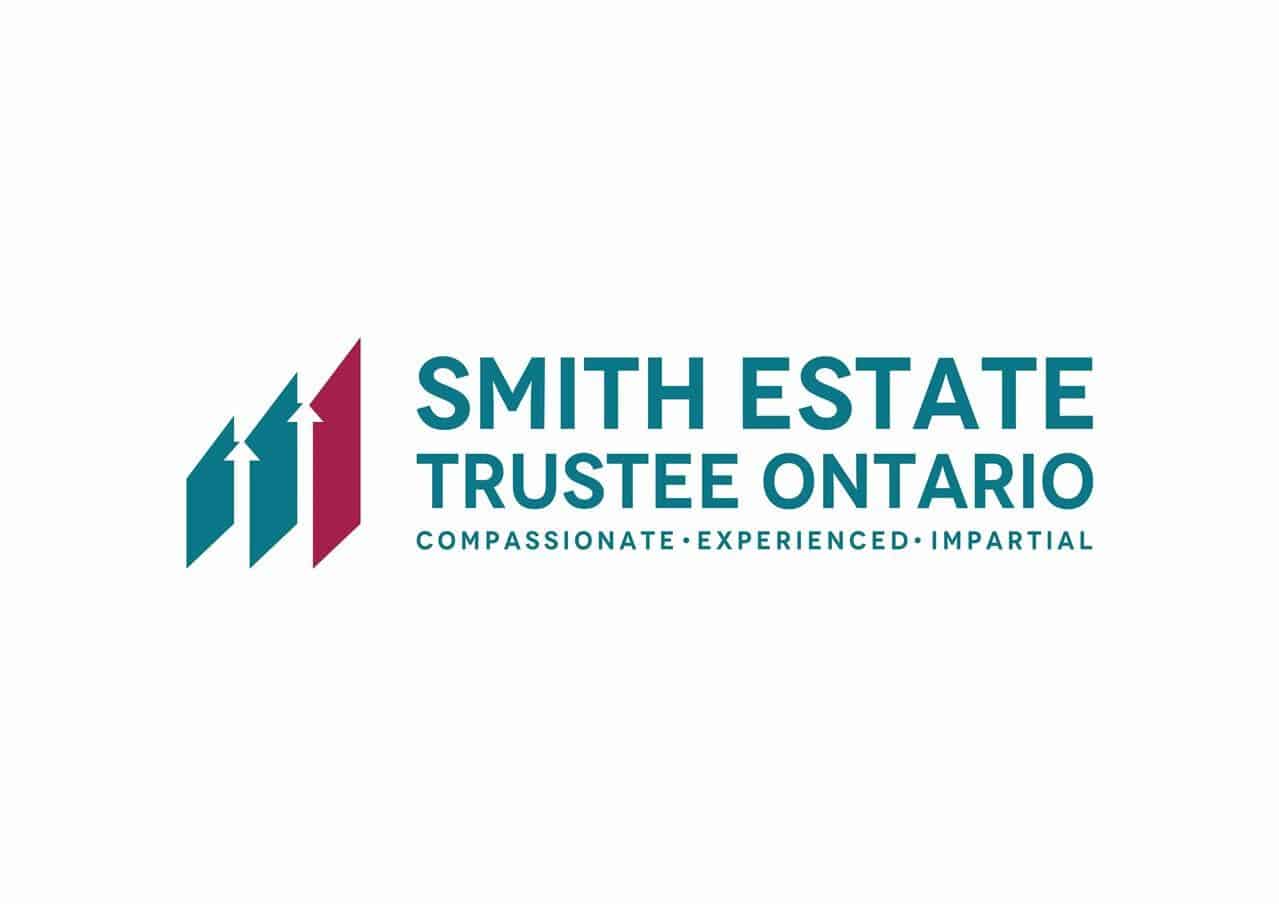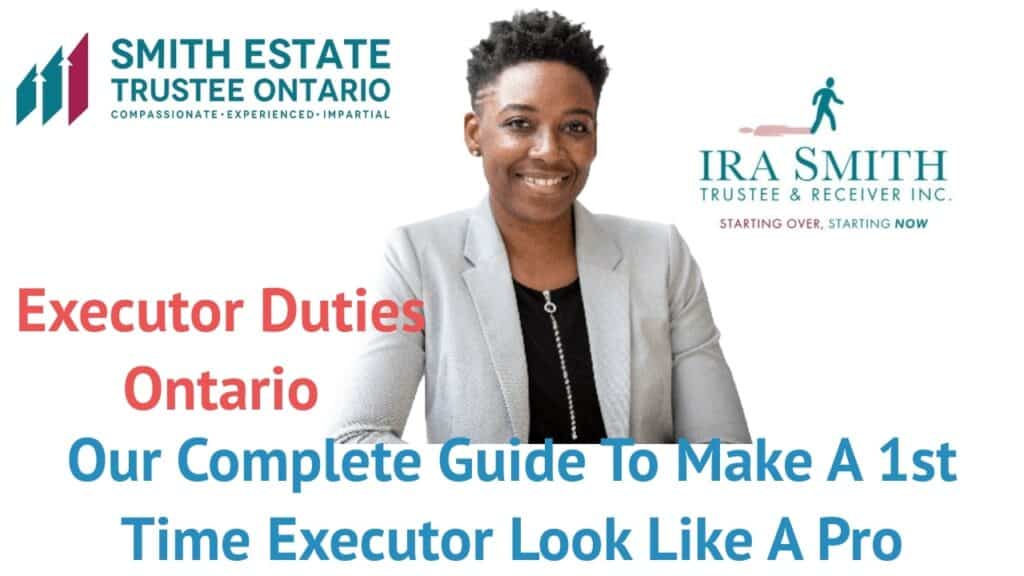
We hope that you and your family are safe, healthy and secure during this coronavirus pandemic.
Ira Smith Trustee & Receiver Inc. is absolutely operational and Ira, in addition to Brandon Smith, is readily available for a telephone consultation or video meeting.
If you would prefer to listen to the audio version of this Brandon Blog, please scroll to the very bottom of the page and click play on the podcast.
Executor duties Ontario: What is an executor or estate trustee?
Executors, or Estate Trustees as they are now called in Ontario, are people named in a Will to become the personal representatives of the deceased. Executor duties Ontario is a complicated process.
The Estate Trustee accepts the role, authorizes the liquidation of the estate assets and the payment of money. The Executor directs and administers the deceased estate both in accordance with provincial and federal laws while abiding by the declared wishes of the deceased.
Executors are people who are legally responsible for the estate of someone who has died. They are required to manage the estate according to the wishes of the deceased person. To be an executor, you must meet certain minimum legal requirements. You should:
- have already turned 18;
- be financially stable;
- reside in Ontario;
- have good organizational skills;
- be able to keep complete records of all the estate’s transactions;
- have a good knowledge of financial matters; and
- be able to make effective decisions about the estate.
Suppose there were no Will? What happens? Without a Will, a court can appoint an Estate Trustee Without A Will.
Through our other business, Smith Estate Trustee Ontario, my Firm acts as a Court-appointed Executor/Estate Trustee. Far too often, the person who ends up with the responsibility of settling the estate of a deceased family member or friend is unprepared to do so. This commonly leads to emotional stress, confusion, and financial hardship.
From this Brandon Blog, you’ll learn everything you need to know about effectively fulfilling your duties as an Estate Trustee in Ontario. You will learn how to handle the estate settlement process in Ontario and properly fulfill the duties using our Executor duties Ontario checklist.
Executor duties Ontario: What does an Executor/Estate Trustee Do Right Away?
Executors are people who are appointed to carry out the Will or trust of a person who has died. They are given the authority to make decisions on behalf of the deceased, as long as those decisions are consistent with the wishes expressed in the deceased’s Will or trust. There can be as many Estate Trustees as are indicated in the Will or trust document. When there is a Will, in Ontario, the role is one of Estate Trustee Under A Will.
Once you are notified that you are named as the Executor or one of the Estate Trustees, the first thing you need to do is to decide if you wish to act. Are you capable of doing the job and are you free from any conflict of interest? It is possible to recuse yourself before taking any steps to act as the Executor. However, once you start acting as the Executor, it is very difficult to resign.
An Executor will obtain a copy of the Will as one of the first things they do. As a result, the person’s most recent Will automatically becomes the last Will of the deceased. Some people are unaware that a Will is only as good as its Executors and how they perform their Executor duties Ontario.
Executor duties Ontario: Follow this guide to look like a professional Estate Trustee
Action #1 – Funeral Arrangements and other Day 1 action
If the family is not taking care of this themselves, then you must arrange for the funeral immediately after death. Religious observance of the family and the wishes of the deceased should be your guide. Other things Executor duties Ontario include are:
- Arrange for organ donation if applicable.
- Find the Will.
- Coordinate with family members to notify friends and family of the passing.
- Request multiple copies of the Proof of Death Certificate from the funeral director.
- Apply for a provincial Death Certificate.
- Make necessary arrangements for the ongoing care for dependents/minor children and pets.
- Contact the deceased’s bank to ensure that all amounts on deposit are safeguarded, access to any safety deposit box is secured and change signing authorities to Executor(s) so that necessary payments can be made.
- Confirm payment to the funeral home.
Action #2 – Submit official paperwork on behalf of the Estate
There are many other notifications that should be made within say, 1 to 2 weeks after the funeral. These Executor duties Ontario consist of:
- File the CPP death benefit claim.
- Transfer the pension to the spouse by applying for CPP Survivor’s Benefits.
- Canada Revenue Agency Notification to Update Record.
- Submit OAS/CPP/GIS notifications.
- Send the Notice of Death to Equifax and TransUnion, the two Canadian credit bureaus.
Action #3 – Protect the hard assets
Concerning any hard assets, as soon as possible after the funeral, Executor duties Ontario include:
- Identify and secure all assets: the home, the contents of the home, and other real estate assets.
- Direct the post office to forward the mail care of the Estate Trustee.
- Inform utilities, landlords, and other service providers.
- Review all documents associated with asset ownership, business, investment, including insurance, mortgages, and leases.
- Analyze all financial documents, including contracts, divorce papers, or separation agreements, court orders.
- Secure personal property, business, vehicles, perishable goods, and safety deposit boxes.
- To keep the insurance coverage active, find out what action you need to take if there is a vacant property.
- Have all the hard assets appraised.
Action #4 – Protecting financial assets
I already mentioned that I would contact any known financial institution. Other Executor duties Ontario to protect financial assets as soon as possible after the funeral, include:
- Gather information about debts and expenses.
- Cut off all unnecessary expenses. People rarely think about memberships or subscriptions until the bill or publication arrives in the mail.
- The other banks or credit unions, investment advisors, and life insurance companies should be notified.
- All credit cards and debit cards should be cancelled.
Action #5 – Contacting beneficiaries
Other Executor duties Ontario include:
- Completing the inventory of assets and their values on the date of death.
- Contacting each of the beneficiaries of Estate individually.
- Explaining the Estate administration process to them.
- Estate beneficiaries need to know they only receive distributions upon the probate of the Will, completion and filing of all final tax returns, and full payment of the estate’s debts and debts of the deceased. How the estate is handled will also depend on its size and nature.
- Depending on the circumstances, the Executor of the estate can make interim distributions.
It is important to keep in mind that Estate Trustees are personally liable. This means if you pay out too much on an interim basis and don’t have enough to cover all the debts, you will be in trouble if you can’t claw back any money.
Action #6 – The probate process
Generally, probate involves completing the necessary Ontario government forms for the confirmation and appointment of the Executor(s), who will manage the estate distribution. The Executor duties Ontario for probate include, say within 30 days after death:
- Speak to the estate administration lawyer for assistance.
- Calculate the estate administration tax for the Ontario estate.
- With the help of the estate administration lawyer, prepare the probate application.
- The probate application, along with all relevant documents, should be filed with the deceased’s local probate court. The required documents, including the original Will and payment of the estate administration tax.
Action #7 – While you are waiting for the Certificate of Appointment of Estate Trustee With A Will
The court can take many months to respond to your probate application, especially in Toronto. In the meantime, there are things that Executor duties Ontario allow you to do without the need to show the Certificate of Appointment. You can use a copy of the Will. These include:
- The deceased’s passport, driver’s license, and Ontario health card can be cancelled.
- Meeting with the investment advisor, banker, and insurance agent to gain a better understanding of the estate’s assets.
- Finalize the list of assets.
- Developing a strategy to liquidate the assets of the estate.
- Choose a real estate broker, negotiate the rate and prepare the listing for posting after the grant of probate is received. Be sure you obtain a professional appraisal first to determine the current market value. You don’t want to rely on just the broker’s estimate of market value.
- Organize an estate sale to dispose of personal belongings that have not been claimed by the family. When appropriate, arrange donations.
- Prepare the property for sale. In almost all cases, minor repairs, painting, cleaning, and staging are necessary.
- Prepare life insurance forms (to be submitted once you have your Certificate evidencing the appointment of the Estate Trustee(s)).
- Stay in constant contact with the beneficiaries to inform them that you are still waiting for the grant of probate and that things are proceeding normally.
Action #8 – Selling the assets in Estate
Some of the following Executor duties Ontario could be done only with a certified copy of the Will. Some will require a Certificate from the court appointing the Estate Trustee:
- Open an estate bank account with your preferred financial institution if you have not already done so.
- Merge all bank accounts into the estate account.
- List any real property for sale.
- Request that all mutual funds, stocks, bonds be liquidated and the funds transferred to the estate
account. - Incorporate all estate sale proceeds and any other cash assets into the estate trust account.
Action #9 – Pay all debts and calculate and pay all taxes
To make the final distribution, the creditors and amounts owing to Canada Revenue Agency must be settled in full. In this phase, Executor duties Ontario include:
- Clear debts.
- Make sure that tax documents are in order.
- Prepare all necessary income tax returns, including the estate tax return, with the help of an accountant or other tax specialist.
- If your Notice of Assessment has been received and the CRA has been paid all amounts owed, you can request a Tax Clearance Certificate from them.
Action #10 – Final distribution to estate beneficiaries and completion of Estate records
Now it is time to make the distribution to beneficiaries and close your file. These Executor duties Ontario are:
- If you are charging a fee, including a care and management fee for having administered the estate, calculate it and pay yourself.
- Prepare and issue the distribution to beneficiaries of the remainder of the estate.
- Prepare a final accounting and issue it to all beneficiaries.
- Get releases from beneficiaries.
- Closing the estate bank account.
- Terminate the deceased’s social insurance number.
Executor duties Ontario: Compensation for estate trustees
The Ontario estate laws and associated regulations provide a framework for the management of a deceased person’s estate and for the distribution of the property. The laws and regulations also deal with the duties and responsibilities of the Executor and compensation for the Estate Trustee.
All Estate Trustees are legally permitted to charge fees. A fee that isn’t in the Will must be an amount that is considered fair and reasonable. The amount depends on the value of your estate and the amount of work your Estate Trustee has to do.
Even though the fee calculation is more complicated than this, for our purposes, you should use as a benchmark 5% of the estate’s value. Additionally, an additional care and management fee of 2/5 of 1% of the average annual value of the assets is sometimes charged.
Executor duties Ontario summary
I hope you found Executor duties Ontario Brandon Blog helpful. If you are concerned because there is an Estate that needs a professional Estate Trustee, Smith Estate Trustee Ontario can help you. Since we are also a licensed insolvency trustee firm, we can also help if the deceased Estate is insolvent. We can also help if you or your business have debt problems.
It is not your fault that you remain in this way. You have actually been only shown the old ways to try to deal with financial issues. These old ways do not work anymore.
The Ira Smith Team utilizes new modern-day ways to get you out of your debt difficulties while avoiding bankruptcy. We can get you the relief you need and so deserve.
The tension put upon you is big. We know your discomfort factors. We will check out your entire situation and design a new approach that is as unique as you and your problems; financial and emotional. We will take the weight off of your shoulders and blow away the dark cloud hanging over you. We will design a debt settlement strategy for you. We know that we can help you now.
We understand that people and businesses facing financial issues need a realistic lifeline. There is no “one solution fits all” method with the Ira Smith Team. Not everyone has to file bankruptcy in Canada. The majority of our clients never do. We help many people and companies stay clear of bankruptcy.
That is why we can establish a new restructuring procedure for paying down debt that will be built just for you. It will be as one-of-a-kind as the economic issues and discomfort you are encountering. If any one of these seems familiar to you and you are serious about getting the solution you need, contact the Ira Smith Trustee & Receiver Inc. group today.
Call us now for a no-cost consultation.
We will get you or your business back up driving to healthy and balanced trouble-free operations and get rid of the discomfort factors in your life, Starting Over, Starting Now.
We hope that you and your family are safe, healthy and secure during this coronavirus pandemic.
Ira Smith Trustee & Receiver Inc. is absolutely operational and Ira, in addition to Brandon Smith, is readily available for a telephone consultation or video meeting.


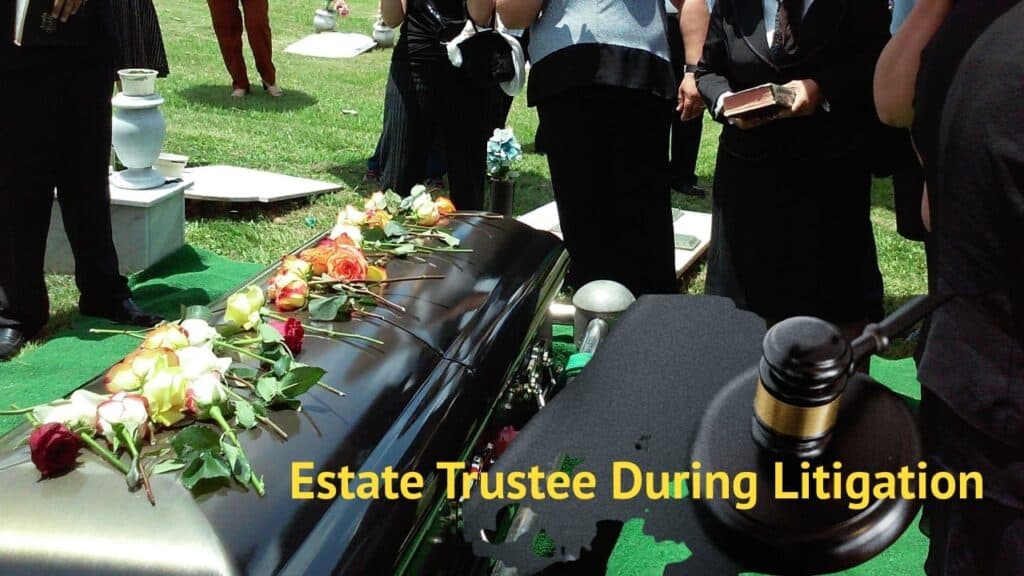 We hope that you and your family are safe, healthy and secure during this COVID-19 pandemic.
We hope that you and your family are safe, healthy and secure during this COVID-19 pandemic.